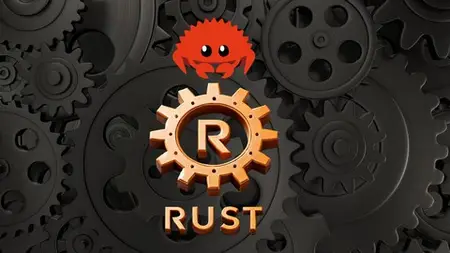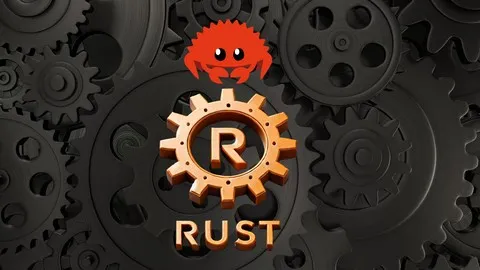Mastering Rust Programming: A Complete Beginner'S Guide To R
Published 1/2025
MP4 | Video: h264, 1920x1080 | Audio: AAC, 44.1 KHz
Language: English | Size: 727.61 MB | Duration: 3h 20m
Published 1/2025
MP4 | Video: h264, 1920x1080 | Audio: AAC, 44.1 KHz
Language: English | Size: 727.61 MB | Duration: 3h 20m
Learn Rust from Scratch and Acquire Practical Programming Skills for Beginners
What you'll learn
Understand the basic syntax of Rust and programming fundamentals, enabling you to create simple applications.
Gain a deep understanding of Rust’s ownership and borrowing concepts, and develop skills to write efficient and safe code.
Learn error handling, data types, and control flow to enhance your programming skills and move towards more advanced techniques.
Through hands-on projects, understand the basic flow of system development using Rust and build your problem-solving abilities.
Requirements
No special prior knowledge is required, though it’s beneficial if you are a beginner in programming. Basic computer skills are recommended.
No special preparation is needed if you have a setup to run programs on your computer. We will guide you through installing Rust in the course.
Description
Rust is a modern systems programming language that excels in speed, safety, and concurrency. In this course, you will start from scratch and learn how to program in Rust, covering everything from the basics to building functional applications. By mastering Rust, you’ll gain one of the most in-demand skills in the world of systems programming, empowering you to tackle complex projects and make valuable contributions to performance-critical applications.This course is specifically designed for beginners, guiding you through the fundamental syntax of Rust and core concepts like variables, control flow, functions, structs, enums, error handling, and more. Additionally, we will take a deep dive into Rust's unique features, including **Ownership** and **Borrowing**, which are central to Rust’s memory safety model. By mastering these concepts, you'll gain a deep understanding of safe memory management and the ability to write more efficient and error-free code.Throughout the course, you will engage with practical projects that allow you to apply what you’ve learned in real-world scenarios. As you work through each project, you will gain hands-on experience with Rust's powerful features, such as writing efficient code, managing errors, and developing systems. By writing code and solving problems, you will experience firsthand how Rust can elevate your programming abilities and help you become a more confident, effective developer.By the end of this course, you will have a solid foundation in basic systems programming with Rust. You will also have a deeper understanding of how high-performance programming languages work, making it easier for you to learn other languages in the future. Whether you want to develop systems, write software with optimal performance, or simply gain a valuable skill, this course will set you on the right path.
Overview
Section 1: Introduction
Lecture 1 Understanding Variables: Declaring and Using Numbers
Lecture 2 Working with Strings: Basic Operations
Lecture 3 Writing Your First Print Statement
Lecture 4 Exploring Basic Data Types
Lecture 5 Adding Else Statements for Alternate Paths
Lecture 6 Chaining Conditions with Else If
Lecture 7 Iterating with Loops: The For Loop
Lecture 8 While Loops: Repeating Until a Condition is Met
Lecture 9 Breaking Out of Loops
Lecture 10 Skipping Iterations with Continue
Lecture 11 Creating and Using Functions
Lecture 12 Returning Values from Functions
Lecture 13 Nested Loops for Advanced Iterations
Lecture 14 Working with Arrays: Storing Multiple Values
Lecture 15 Accessing Array Elements
Section 2: Beginner
Lecture 16 Using Loops to Process Arrays
Lecture 17 Understanding Tuples: Grouping Values
Lecture 18 Using Enums to Define Fixed Options
Lecture 19 Simple Pattern Matching with Enums
Lecture 20 Working with Match Statements
Lecture 21 Creating and Using Struct Instances
Lecture 22 Implementing Methods for Structs
Lecture 23 Understanding Ownership: Moving Values
Lecture 24 Borrowing References with Functions
Lecture 25 Understanding Mutability in References
Lecture 26 Using Vectors for Dynamic Arrays
Lecture 27 Adding and Removing Elements in Vectors
Lecture 28 Iterating Over Vectors in Rust
Lecture 29 Inserting and Retrieving Hash Map Values
Lecture 30 Handling Missing Values in Hash Maps
Section 3: Intermediate
Lecture 31 Defining and Using Constants
Lecture 32 Implementing Basic Error Handling with Result
Lecture 33 Using Option for Optional Values
Lecture 34 Creating and Using Modules
Lecture 35 Importing Functions from Other Modules
Lecture 36 Appending Data to Files
Lecture 37 Working with Command-Line Arguments
Lecture 38 Parsing Numbers from Strings
Lecture 39 Creating and Manipulating Strings
Lecture 40 Using String Slices for Efficient Operations
Lecture 41 Using the Debug Trait to Print Custom Types
Lecture 42 Implementing Display for Custom Output
Lecture 43 Writing Unit Tests for Your Code
Lecture 44 Asserting Conditions in Tests
Lecture 45 Understanding Ownership Rules in Loops
Section 4: Advanced
Lecture 46 Creating Recursive Functions
Lecture 47 Using Box for Heap Allocation
Lecture 48 Creating Simple Closures
Lecture 49 Passing Closures to Functions
Lecture 50 Capturing Environment in Closures
Lecture 51 Using Iterators to Process Collections
Lecture 52 Chaining Iterator Methods for Transformation
Lecture 53 Filtering and Collecting Iterators
Lecture 54 Using Map to Transform Values
Lecture 55 Creating a Basic Struct for Point Geometry
Lecture 56 Using Mutex to Protect Shared Data
Lecture 57 Splitting Strings into Words
Lecture 58 Tracking Scores in a Game Using Structs
Lecture 59 Drawing a Simple Shape with Loops
Lecture 60 Calculating the Fibonacci Sequence
Lecture 61 Using Basic Matrix Operations
This course is ideal for beginners who are interested in learning Rust and want to dive into systems programming. It is also valuable for anyone interested in system development.,This course is perfect for those with an engineering background who want to improve their programming skills using Rust.



